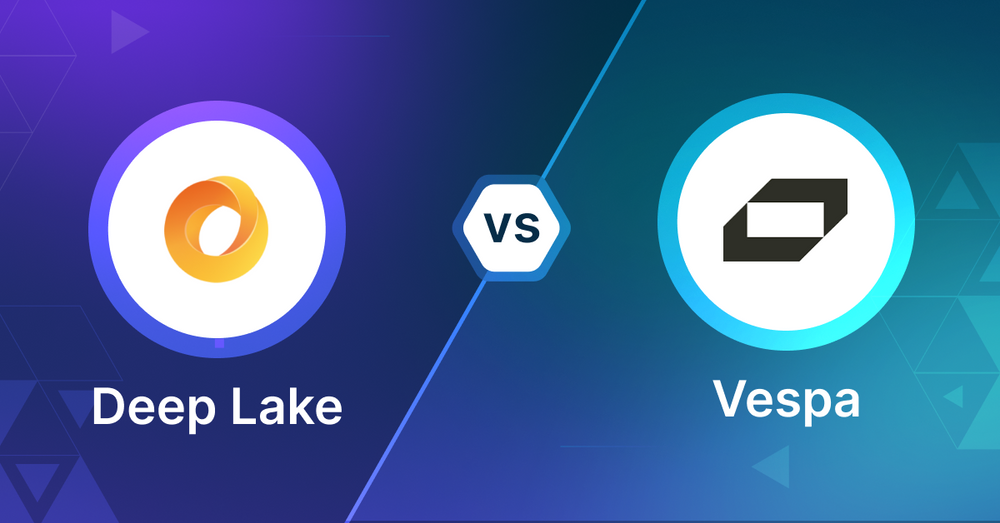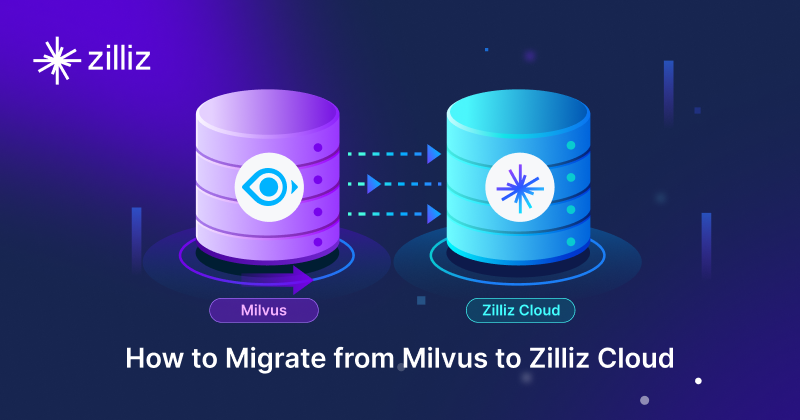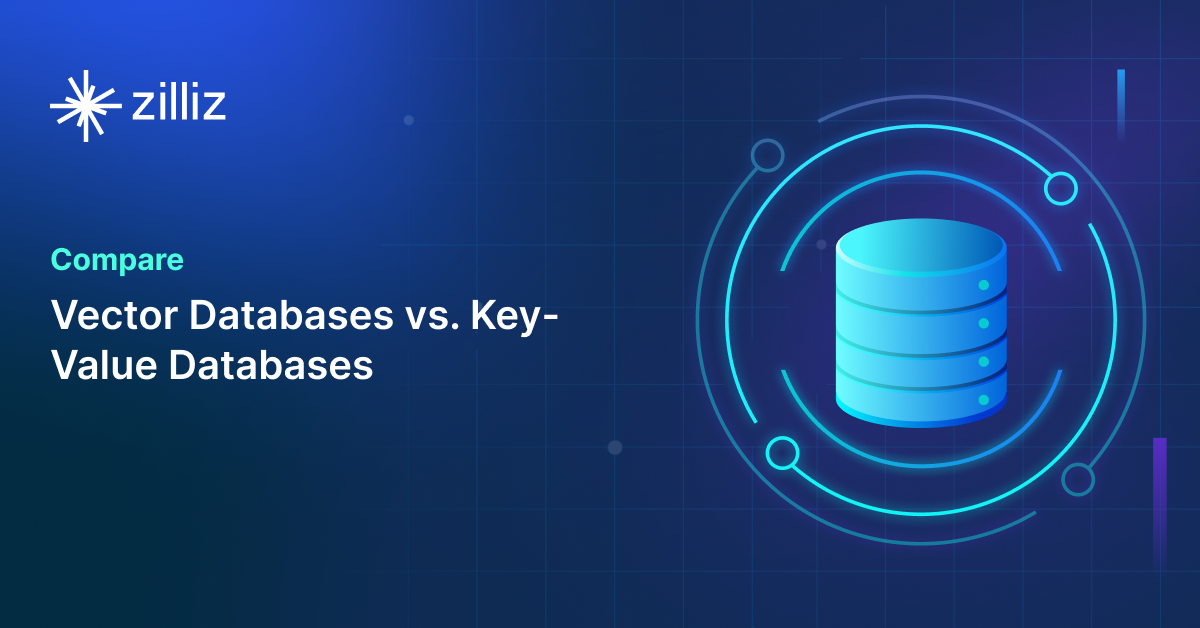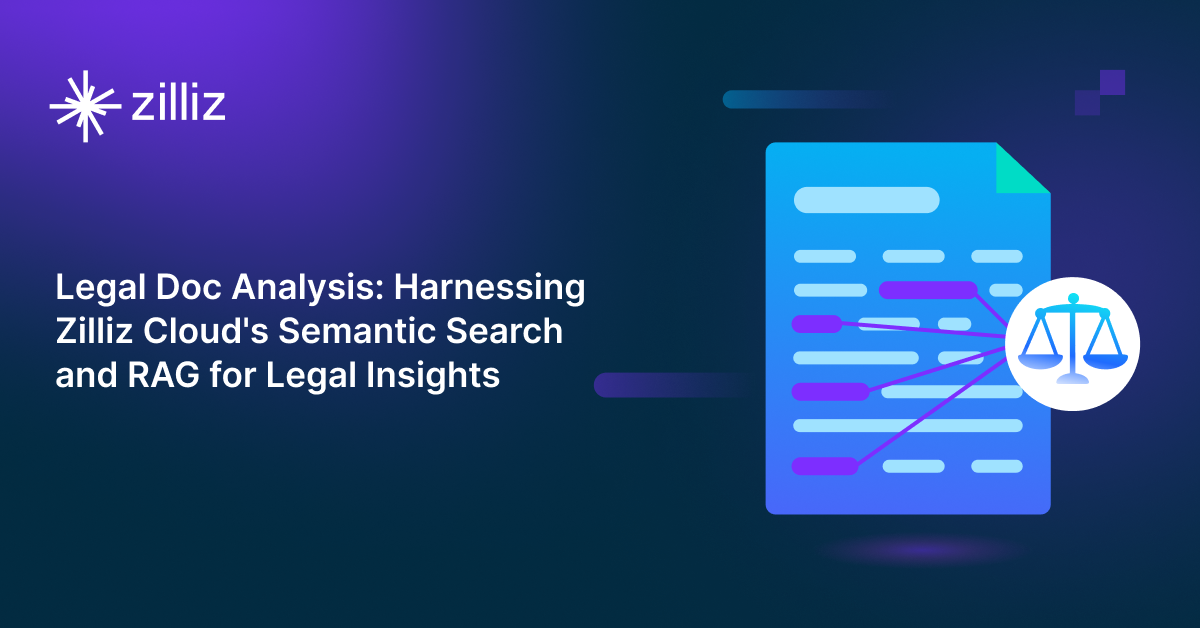Vespa vs Deep Lake Choosing the Right Vector Database for Your AI Apps

What is a Vector Database?
Before we compare Vespa and Deep Lake, let's first explore the concept of vector databases.
A vector database is specifically designed to store and query high-dimensional vectors, which are numerical representations of unstructured data. These vectors encode complex information, such as the semantic meaning of text, the visual features of images, or product attributes. By enabling efficient similarity searches, vector databases play a pivotal role in AI applications, allowing for more advanced data analysis and retrieval.
Common use cases for vector databases include e-commerce product recommendations, content discovery platforms, anomaly detection in cybersecurity, medical image analysis, and natural language processing (NLP) tasks. They also play a crucial role in Retrieval Augmented Generation (RAG), a technique that enhances the performance of large language models (LLMs) by providing external knowledge to reduce issues like AI hallucinations.
There are many types of vector databases available in the market, including:
- Purpose-built vector databases such as Milvus, Zilliz Cloud (fully managed Milvus)
- Vector search libraries such as Faiss and Annoy.
- Lightweight vector databases such as Chroma and Milvus Lite.
- Traditional databases with vector search add-ons capable of performing small-scale vector searches.
Vespa is a purpose-built vector database. Deep Lake is a data lake optimized for vector embeddings with vector search capabilities as an add-on. This post compares their vector search capabilities.
Vespa: Overview and Core Technology
Vespa is a powerful search engine and vector database that can handle multiple types of searches all at once. It's great at vector search, text search, and searching through structured data. This means you can use it to find similar items (like images or products), search for specific words in text, and filter results based on things like dates or numbers - all in one go. Vespa is flexible and can work with different types of data, from simple numbers to complex structures.
One of Vespa's standout features is its ability to do vector search. You can add any number of vector fields to your documents, and Vespa will search through them quickly. It can even handle special types of vectors called tensors, which are useful for representing things like multi-part document embeddings. Vespa is smart about how it stores and searches these vectors, so it can handle really large amounts of data without slowing down.
Vespa is built to be super fast and efficient. It uses its own special engine written in C++ to manage memory and do searches, which helps it perform well even when dealing with complex queries and lots of data. It's designed to keep working smoothly even when you're adding new data or handling a lot of searches at the same time. This makes it great for big, real-world applications that need to handle a lot of traffic and data.
Another cool thing about Vespa is that it can automatically scale up to handle more data or traffic. You can add more computers to your Vespa setup, and it will automatically spread the work across them. This means your search system can grow as your needs grow, without you having to do a lot of complicated setup. Vespa can even adjust itself automatically to handle changes in how much data or traffic you have, which can help save on costs. This makes it a great choice for businesses that need a search system that can grow with them over time.
What is Deep Lake? Overview and Core Technology
Deep Lake is a specialized database built for handling vector and multimedia data—such as images, audio, video, and other unstructured types—widely used in AI and machine learning. It functions as both a data lake and a vector store:
- As a Data Lake: Deep Lake supports the storage and organization of unstructured data (images, audio, videos, text, and formats like NIfTI for medical imaging) in a version-controlled format. This setup enhances performance in deep learning tasks. It enables fast querying and visualization of datasets, making it easier to create high-quality training sets for AI models.
- As a Vector Store: Deep Lake is designed for storing and searching vector embeddings and related metadata (e.g., text, JSON, images). Data can be stored locally, in your cloud environment, or on Deep Lake’s managed storage. It integrates seamlessly with tools like LangChain and LlamaIndex, simplifying the development of Retrieval Augmented Generation (RAG) applications.
Deep Lake uses the Hierarchical Navigable Small World (HNSW) index, based on the Hnswlib package with added optimizations, for Approximate Nearest Neighbor (ANN) search. This allows querying over 35 million embeddings in less than 1 second. Unique features include multi-threading for faster index creation and memory-efficient management to reduce RAM usage.
By default, Deep Lake uses linear embedding search for datasets with up to 100,000 rows. For larger datasets, it switches to ANN to balance accuracy and performance. The API allows users to adjust this threshold as needed.
Although Deep Lake’s index isn't used for combined attribute and vector searches (which currently rely on linear search), upcoming updates will address this limitation to improve its functionality further.
Deep Lake as a Vector Store: Deep Lake provides a robust solution for storing and searching vector embeddings and their associated metadata, including text, JSON, images, audio, and video files. You can store data locally, in your preferred cloud environment, or on Deep Lake's managed storage. Deep Lake also offers seamless integration with tools like LangChain and LlamaIndex, allowing developers to easily build Retrieval Augmented Generation (RAG) applications.
Key Differences
When deciding between Vespa and Deep Lake as a vector search tool, understanding the differences across the key dimensions will help you choose the right one for your use case. Here’s a breakdown of their strengths and trade-offs:
Search Methodology
Vespa: Vespa excels at multi-modal search, combining vector search, text search and structured data queries in one system. It supports advanced search scenarios, such as filtering vector-based results by structured fields (e.g. date or category). Vespa’s own engine is optimized for high-performance vector search and can handle complex queries, including multi-part document embeddings represented as tensors.
Deep Lake: Deep Lake is specialized for vector search on multimedia data (e.g. images, audio, video). It uses the HNSW algorithm for Approximate Nearest Neighbor (ANN) search, great for rapid, large-scale similarity searches. However it doesn’t support combining vector and attribute filters directly within the index. This might be a limitation for applications that require tight integration of structured and unstructured searches.
Data Handling
Vespa: Vespa is very versatile, handling structured, semi-structured and unstructured data. It supports custom data models, so it’s good for a wide range of applications beyond vector search, such as recommendation systems or e-commerce platforms.
Deep Lake: Deep Lake is focused on multimedia and unstructured data. It’s a data lake for storing and organizing large datasets, especially for AI and machine learning workflows. Its version-controlled format makes collaboration and dataset curation easy but might not be suitable for applications that require robust structured data handling.
Scalability and Performance
Vespa: Vespa is designed for enterprise scale. Its distributed architecture can handle large datasets and high query volumes. Dynamic scaling ensures efficient resource utilization as data and traffic grows. C++ engine means low latency even under heavy load.
Deep Lake: Deep Lake scales well for large vector datasets, can handle tens of millions of embeddings with sub-second query times. While it’s good for vector-based searches, its linear search for smaller datasets or combined searches might be a performance bottleneck in some cases.
Flexibility and Customization
Vespa: Lots of customization options for data modeling, query construction and ranking algorithms. Developers can tune search behavior to fit their business needs, so Vespa is great for highly custom applications.
Deep Lake: Designed for ease of use for AI workflows, Deep Lake has flexible APIs for embedding storage, version control and querying. But its search logic customization options are narrower than Vespa.
Integration and Ecosystem
Vespa: Vespa integrates with general purpose tools and frameworks. Not tied to specific AI workflows but can complement them by providing a search foundation.
Deep Lake: Deep Lake is deeply integrated with AI/ML ecosystems, works seamlessly with LangChain, LlamaIndex and major deep learning frameworks. Great for building Retrieval Augmented Generation (RAG) systems.
Ease of Use
Vespa: Powerful features come with a steeper learning curve. Setup, configuration and maintenance requires some expertise, especially for distributed deployments.
Deep Lake: Deep Lake is designed for developer simplicity, with simple APIs and clear documentation for AI practitioners. Managed service options reduce operational overhead.
Cost
Vespa: Cost depends on infrastructure and scaling requirements. Self-hosting can be resource intensive but Vespa’s resource optimization helps with long term costs.
Deep Lake:Deep Lake’s pricing is based on storage and query volume, especially when using the managed service. Its efficiency for large scale vector search keeps operational costs competitive.
Security
Vespa: Enterprise grade security, encryption, auth and access control. Suitable for organizations with high security requirements.
Deep Lake: Security for managed services, data encryption and access controls. Security for self-hosted needs extra work.
When to choose Vespa
Vespa is great for when you need a search system that can handle vector, text and structured data in one place. Distributed and scalable it’s perfect for high traffic and large scale environments like e-commerce, recommendation systems and enterprise search. If your use case involves complex queries with attribute filtering and vector similarity search or if you need a lot of customization to fit your business needs, Vespa has the flexibility and performance to deliver.
When to choose Deep Lake
Deep Lake is great for AI and machine learning workflows that heavily rely on unstructured or multimedia data like images, audio and video. Its integration with LangChain and LlamaIndex makes it a good fit for Retrieval-Augmented Generation (RAG) applications and other deep learning tasks. If you want to manage and query large scale vector embeddings with ease and have version control for your datasets, Deep Lake’s simplicity and focus on AI ecosystems is a streamlined solution for AI practitioners and researchers.
Summary
Vespa is great for complex, distributed search scenarios with multiple data types and lots of customization for enterprise scale. Deep Lake is great for vector search and data handling for AI workflows, simple and efficient for multimedia and unstructured data. Choose the right one for your use case: Vespa for broader search needs, Deep Lake for AI driven projects with vector embeddings and dataset management.
Read this to get an overview of Vespa and Deep Lake but to evaluate these you need to evaluate based on your use case. One tool that can help with that is VectorDBBench, an open-source benchmarking tool for vector database comparison. In the end, thorough benchmarking with your own datasets and query patterns will be key to making a decision between these two powerful but different approaches to vector search in distributed database systems.
Using Open-source VectorDBBench to Evaluate and Compare Vector Databases on Your Own
VectorDBBench is an open-source benchmarking tool for users who need high-performance data storage and retrieval systems, especially vector databases. This tool allows users to test and compare different vector database systems like Milvus and Zilliz Cloud (the managed Milvus) using their own datasets and find the one that fits their use cases. With VectorDBBench, users can make decisions based on actual vector database performance rather than marketing claims or hearsay.
VectorDBBench is written in Python and licensed under the MIT open-source license, meaning anyone can freely use, modify, and distribute it. The tool is actively maintained by a community of developers committed to improving its features and performance.
Download VectorDBBench from its GitHub repository to reproduce our benchmark results or obtain performance results on your own datasets.
Take a quick look at the performance of mainstream vector databases on the VectorDBBench Leaderboard.
Read the following blogs to learn more about vector database evaluation.
Further Resources about VectorDB, GenAI, and ML
- What is a Vector Database?
- Vespa: Overview and Core Technology
- What is Deep Lake? Overview and Core Technology
- Key Differences
- Using Open-source VectorDBBench to Evaluate and Compare Vector Databases on Your Own
- Further Resources about VectorDB, GenAI, and ML
Content
Start Free, Scale Easily
Try the fully-managed vector database built for your GenAI applications.
Try Zilliz Cloud for FreeKeep Reading

Why and How to Migrate from Self-Hosted Milvus to Zilliz Cloud
A simple, step-by-step guide to migrating from Milvus to Zilliz Cloud. Learn both endpoint and backup methods for a smooth, scalable vector database migration.

Vector Databases vs. Key-Value Databases
Use a vector database for AI-powered similarity search; use a key-value database for high-throughput, low-latency simple data lookups.

Legal Document Analysis: Harnessing Zilliz Cloud's Semantic Search and RAG for Legal Insights
Zilliz Cloud transforms legal document analysis with AI-driven Semantic Search and Retrieval-Augmented Generation (RAG). By combining keyword and vector search, it enables faster, more accurate contract analysis, case law research, and regulatory tracking.
The Definitive Guide to Choosing a Vector Database
Overwhelmed by all the options? Learn key features to look for & how to evaluate with your own data. Choose with confidence.